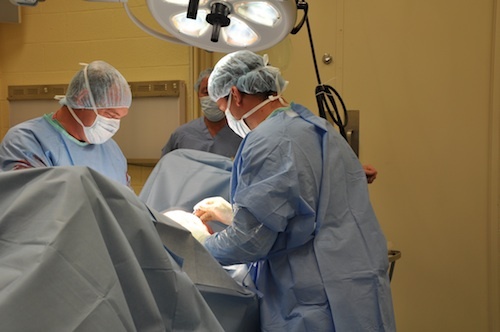Tag: staff
By Alice Collins / Jump Media
Hailing from Minnesota, Allison Schatzley has been an avid horse lover since she was small and has worked in the industry since she graduated from the University of Wisconsin. She joined the Palm Beach Equine Clinic (PBEC) team in the fall of 2023.
Where are you from?
I’m originally from Minnesota and completed my undergraduate degree in animal science equine management with an emphasis on animal nutrition at the University of Wisconsin-River Falls.
What is your background with horses?
I’ve been riding since I can remember, and I worked at barns cleaning stalls through high school and college. After I graduated, I pursued a career in equine nutrition, helping owners feed their horses according to their goals, such as performance, weight loss, and weight gain.

What brought you to PBEC?
A little over a year ago, I decided I needed a change. I missed being directly involved with equine care and searched for a job that could fulfill that. I found PBEC and thought I could utilize my background augment the patient care.
What does your job involve?
A typical day involves assessing the patients I’ve been assigned for the day, performing treatments at their scheduled times, such as administering medications, changing standing wraps, grooming, and helping doctors with their procedures on the hospital patients. When we get an emergency in, I’ll pull blood for lab work, place the catheter, hang the fluids, or prep them for surgery if need be.
What aspects of equine medicine interest you most?
It’s been pretty interesting to be able to tie my nutrition background to certain instances, including my favorites, the horses with laminitis. It allows me to better understand some cases.
What cases that you’ve worked on stand out?
We recently had a burn victim from a barn fire. He was the sweetest horse, and it was so rewarding when he got to return home!

What’s the best thing about your job?
My favorite part of the job is being able to spend my time taking care of the horses and making sure I’ve done all I can to ensure they are feeling the best they possibly can in their current situation and condition. At PBEC, we have a great crew for the upcoming season, and I’m excited about what this winter will bring.
What do you enjoy doing in your free time?
I love to bake! I make anything from cakes and cupcakes to pastries and breads. I bring in my creations most of the time, and I love sharing them with my coworkers. I go to the gym quite often, lifting weights and running. I also love spending time with my boyfriend and our critters at home.
To learn more about the full range of services offered at Palm Beach Equine Clinic, call 561-793-1599 or visit https://equineclinic.com/.
By Alice Collins / Jump Media
Originally from Virginia, Mackenzie Harmon completed her undergraduate degree at Lynn University in Boca Raton, FL, in May of 2023. Later that year, she joined the Palm Beach Equine Clinic (PBEC) team as a veterinary technician for Dr. Tyler Davis.
What is your background with horses?
I have a big background with horses. My dad bought a farm in 2007, got a few horses, and had my sister and I start riding. I was seven at the time, and I’ve been riding ever since. I always took every opportunity I could to watch and learn as much as I could, whether that was from a vet, a farrier, or a barn manager. In 2020, I worked as a barn manager for a few weeks and really enjoyed that.
When and why did you decide you wanted to become a vet tech?
When I finished school, I was torn between going to nursing school and being an ER nurse, a scrub nurse in the OR, or becoming a vet. I looked for a job as a nurse for months and was unsuccessful, so I decided to apply to an equine hospital and see if I would get a position. When I got the job at the equine clinic, I figured it would help me decide whether I loved working with animals and wanted to become a vet, or if I hated it and wanted to become a nurse.
Originally, I didn’t think I had enough experience to be a vet tech so I applied to just be a vet tech assistant, cleaning stalls and helping hold horses if the techs were too busy. After doing that for a few weeks, I realized I was over-qualified and should have just been a tech. I worked as a vet tech assistant at Rood and Riddle Equine Hospital, and after being there for a few months I got a job offer from Palm Beach Equine Clinic to be a hospital technician. As soon as I started I realized it was way more up my alley.

What does a typical day look like for you at Palm Beach Equine Clinic?
I currently work as an ambulatory technician, so my days are spent in the car traveling to different farms to treat horses. My boss, Dr. Davis, specializes in dentistry so we float a lot of teeth. During the winter season, it’s pretty much non-stop and we generally put in 10-hour days or more. The summertime slows down a little bit, but there are still some days when we go non-stop. If we aren’t doing dentals, you can find us doing sports medicine work, such as injecting joints and taking x-rays.
What aspects of equine medicine interest you most, and what types of cases do you find most rewarding?
Even though I’ve been working with vets for about a year, I’m still not sure what aspect interests me most. I find surgery really cool, but I also enjoy the sports medicine side of things. I find every case rewarding in its own way because we are always there to help the horses feel better and perform their best.
What is one of the most interesting cases you have worked on?
There was a horse who kept coming to the clinic due to not eating. We started by scoping him for ulcers and then treating him for ulcers. Several weeks later the same horse came back because he still wasn’t eating, so we pulled out all of his incisor teeth. After doing that, the horse has been thriving and is now eating like crazy.
What’s your favorite part of the job?
It’s hard to pick just one part. I am such an animal lover, so I just enjoy being with the horses. I also love it when we’re able to fix a problem that a horse might be having and then seeing them thrive later on.
When not at PBEC, what do you enjoy doing?
When I am not working, you can find me at my own barn riding my horse, or at Vinceremos Therapeutic Riding Center, helping staff with lessons, teaching lessons myself, or schooling their horses.
To learn more about the full range of services on offer at Palm Beach Equine Clinic, call 561-793-1599 or visit https://equineclinic.com/.
5 Questions for Dr. Jordan Lewis

Dr. Jordan Lewis is a graduate of the University of Florida College of Veterinary Medicine and has dedicated her professional career to serving her home state. Dr. Lewis grew up with horses and completed an internship in equine medicine and surgery at the Equine Medical Center in Ocala.
Get to know Dr. Lewis:
1. What is your background with horses?
I moved from New York City to Fort Lauderdale, FL, when I was eight years old. My dad grew up loving horses, and when I was two, he bought a horse. We would travel from our home in New York City to visit him in the Pocono Mountains every weekend to ride. My first experience on a horse was riding double with my dad through cornfields. When I was eight years old, we moved to Florida and I was lucky enough to get my own pony. I got totally hooked on horses and I competed on the Arabian circuit as a teenager.
2. What inspired you to pursue veterinary medicine?
As a child, I participated in local 4-H programs and had the experience of touring an equine surgical and rehabilitation facility. I realized early that this was exactly what I wanted to do as my career.
3. When did you join Palm Beach Equine Clinic and what is your specialty?
I joined the team at Palm Beach Equine Clinic in June of 2005. I love the fact that we have such a dynamic team of veterinarians to work with and consult on difficult cases. I wouldn’t say I have a main focus as I am able to do everything from sports medicine and lameness exams to reproduction work thanks to the clinic’s wide range of cases and capabilities.

4. What advice would you give someone who wants to become an equine vet?
I would tell them that a career in large animal veterinary care is not just a job, it is a lifestyle. If it is what you are meant to do, you will love every minute of this lifestyle. I get to be outside and around horses all day. For me, this is the greatest profession.
5. What is one of the most interesting cases you have worked on?
The most interesting case I have worked on was a pericardial effusion. The condition is caused by excess fluid between the heart and the sac surrounding the heart, known as the pericardium. To remove the fluid, I performed a pericardiocentesis, which involved placing a drain within the sac around the heart to drain the excess fluid and relieve pressure on the heart. That is not something you get to do every day!
Interns at Palm Beach Equine Clinic are a vital part of keeping the day-to-day operations running smoothly, whether assisting the veterinarians, caring for the horses in the hospital, or attending farm calls. Hailing from Lake Worth, FL, Sidney Chanutin, 26, is a Florida Atlantic University alumni and recent graduate of the University of Florida College of Veterinary Medicine and joined Palm Beach Equine Clinic as an intern this year.
Learn more about Sidney:
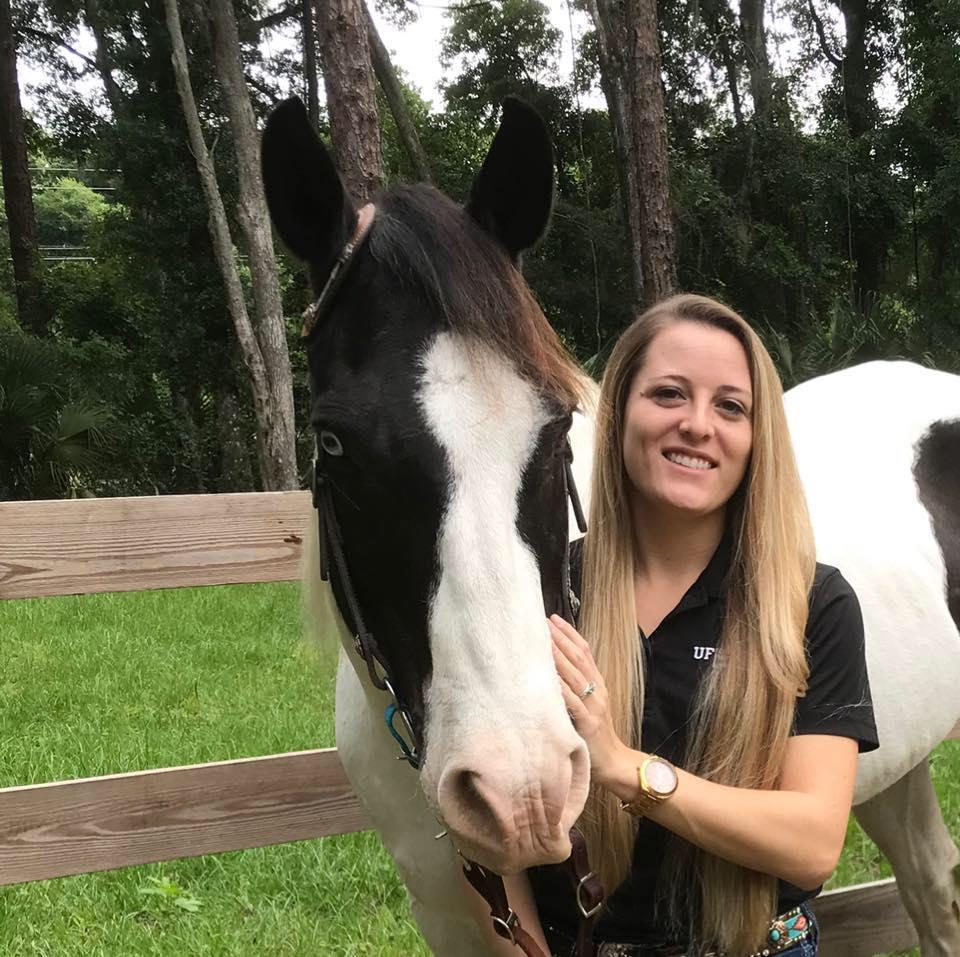
How did you first get involved with horses?
I have always had a passion for horses. I remember as a kid, I was always bugging my parents for riding lessons and to buy my sister and me a pony. I got my first horse when I was eight years old and have been hooked ever since.
What led you to study equine veterinary medicine?
Since before I can remember, my goal has always been to become an equine veterinarian. As a South Florida native, being able to watch the vets at Palm Beach Equine Clinic take such great care of my own horses played a big role in my desire to practice equine veterinary medicine.
Aside from my passion for horses and general happiness when I am around them, I love being able to work outside. The thought of working a nine-to-five job in the same office every day did not suit me. I love being able to travel from farm to farm and see new people every day.
What are your day-to-day responsibilities at Palm Beach Equine Clinic?
As an intern, I am responsible for looking after inpatients, running anesthesia for surgeries, assisting in emergencies, and helping senior doctors with various exams and procedures.
What do you enjoy most about being part of the Palm Beach Equine Clinic team?
The Palm Beach Equine Clinic team is just that, a team. It is amazing to me how all of these people from so many different backgrounds all come together with a common goal—to help horses. That is one of the reasons I chose to do my internship here. Everyone looks out for one another, whether it’s just lending a helping hand or giving advice on a difficult case. I am blessed to have the opportunity to learn from each member of the Palm Beach Equine Clinic staff.
Do you have any stand-out cases that you have really enjoyed working on while at Palm Beach Equine Clinic?
It is hard for me to pick any one case, but I would say that working with the more intensive care patients, such as surgical colics, has been the most rewarding for me. These patients are very sick and require around-the-clock care, so it becomes hard not to become emotionally invested. That being said, having a strong emotional connection to the patients makes the cases where we have good outcomes that much more rewarding. There is no one in the world who gets more excited about bowel movements than a veterinarian who is caring for a patient with colic!
What branch of equine medicine do you enjoy the most?
I am very interested in both sports medicine and rehabilitation as well as ophthalmology.
What can we find you doing when you are not working?
I have two Quarter Horses, “Bolo” and “Ruby,” that I love to take on trail rides. I love spending my time outdoors, so when I’m not riding or taking care of my horses, you can find me fishing with my fiancé.
Palm Beach Equine Clinic’s surgical team leader, Dr. Robert Brusie, is a nationally renowned board-certified surgeon whose surgical specialties include orthopedic, arthroscopic, and emergency cases. Dr. Brusie has been the head surgeon with Palm Beach Equine Clinic for the last 20 years and is a beloved part of the team.
Dr. Brusie graduated from Michigan State University (MSU) College of Veterinary Medicine. He completed his surgical residency at the Marion DuPont Scott Equine Center in Virginia in 1989 and has been in private practice ever since. He became a Diplomate of the American College of Veterinary Surgeons in 1994. Dr. Brusie joined the Palm Beach Equine Clinic team in 1996.
Board-certified surgeon, Dr. Brusie is recognized for his expertise in colic surgery, as well as for his skill in arthroscopic surgery. His surgical experience expands the clinic’s progressive care in both emergency and elective procedures. He has published articles on numerous topics, including the equine intestinal tract and septic arthritis in horses. Dr. Brusie is married and has three daughters. Read on to find out more about Dr. Brusie!
What is your background with horses?
I grew up on a farm in Michigan. We had usually between 200 and 600 head of cattle and always between four to six horses. Our horses were cow ponies or driving horses. My dad loved horses and had to have them around. My family has owned our farm for six generations and it pretty much occupied all of our time besides sports and school. Needless to say, we didn’t have much time to show horses.
When and why did you decide to become a veterinarian? Did you know you wanted to be a surgeon from the start?
I decided to become a veterinarian at an early age. I think I was seven or eight years old when I pulled my first calf. One of my dad’s hired men called me “Doc” when I was about that age. When I went to college, my plan was to become a large animal veterinarian and live in my hometown and continue to farm part-time with my three brothers. All of that changed when I was in veterinary school at MSU. Dr. Ed Scott was one of the five surgeons there; he was a gifted surgeon and a great teacher. He steered me into an equine internship at Auburn University. It was one of those things that the more you did, the more you wanted to do to improve yourself. I operated on my first colic by myself when I was three weeks out of vet school (32 years ago).
How did you first start working at Palm Beach Equine Clinic?
I was a surgeon at a clinic in Atlanta, and in 1996 I had performed a surgery for a client of Dr. Paul Wollenman’s. He had started this practice in 1975 and asked me if I needed a job. I was planning on staying in Atlanta for the rest of my career. I received phone calls from the other two partners over the next nine months, and eventually with encouragement from my fiancé, now wife, Melissa, I took the job.
What do you love most about working at Palm Beach Equine Clinic?
We have an exceptional group of veterinarians and staff here. The depth and scope of our veterinarians is amazing due to the large caseload. On any individual case, there may be two to three doctors that have input on the case to ensure no stone is left unturned. Additionally, we are so privileged to work on some of the best show, race, and polo horses in the world. It is truly an honor.
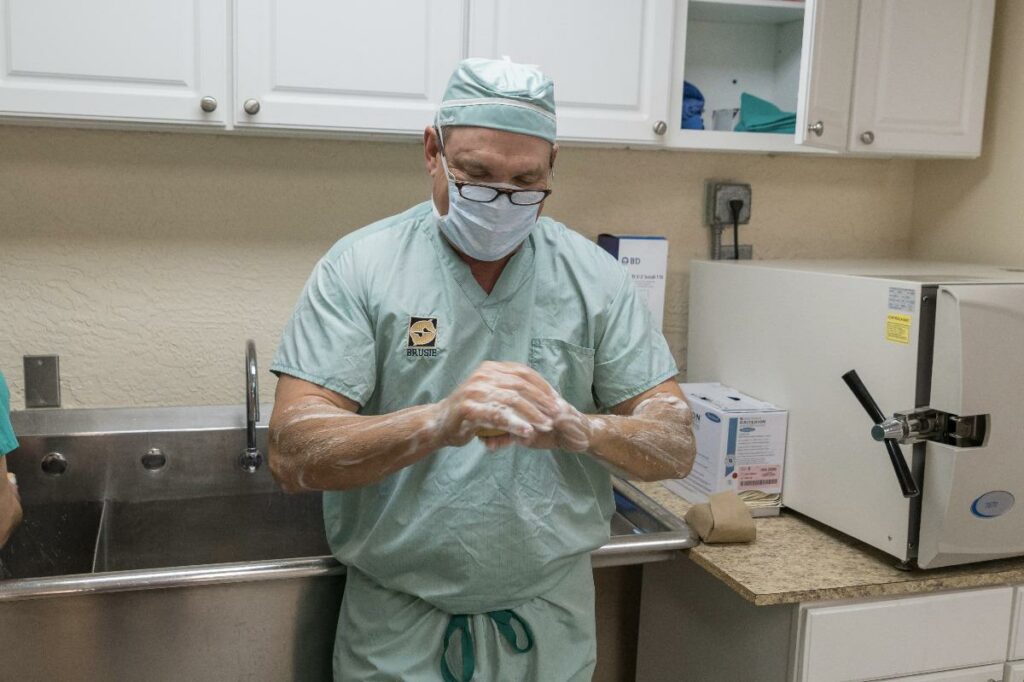
What sets the surgical services at Palm Beach Equine Clinic apart?
Between Dr. Jorge Gomez, Dr. Weston Davis, and myself, we perform just about every type of soft tissue and orthopedic surgeries that are done in our field. Personally, my greatest sense of success is when I see a horse back after surgery going as well or better than it was prior to surgery.
What are the biggest changes you have seen in sport horse medicine over the years?
Currently, the most exciting thing we see going on in medicine is regenerative therapy. Twelve to 15 years ago, we were harvesting bone marrow from the sternum and injecting it into lesions in tendons and ligaments. Now we manipulate the bone marrow or other sources of stem cells to promote more rapid and more functional healing of some of these injuries. I can assure you that in 10 to 20 years what we are doing now will seem stone-aged by then. There are some very clever minds performing some serious research in this field.
How do you stay up-to-date on new medical advances?
Every veterinarian at Palm Beach Equine Clinic tries to attend as many meetings as time allows. We also do a weekly journal club at our clinic to discuss recently published papers in veterinary and human medicine and surgery.
What is the most interesting or challenging surgery that you have done?
Dr. Gomez and I had a three-year-old racehorse that had split his P1 (long pastern bone) and cannon bone in the same leg in a race. We were able to piece together both bones perfectly and the horse recovered brilliantly. He probably could have returned to racing, however, the owners elected to retire him to life as a breeding stallion.
What is something interesting that people may not know about you?
I have three daughters who I am very proud of and tend to brag on maybe a little too much.
How else is the family involved in horses?
My wife [Melissa] and youngest daughter [Kayla] are horse nuts in the true sense of the word. Anything to do with horses, especially show hunters, they are dialed in. Melissa loves riding, and Kayla shows in hunters and equitation.
What makes Palm Beach Equine Clinic a special place for you?
I am blessed to have three good men as business partners. They are my good friends and great people. We are very lucky to have 20-plus veterinarians working with us who are very knowledgeable and caring individuals. We feel like a little practice, but with a lot of people who just get the job done.
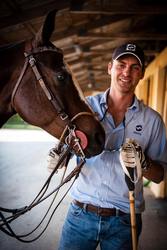
Dr. Bryan Dubynsky joined the team of veterinarians at Palm Beach Equine Clinic in 2009 and specializes in treating sport horses, working to return them to top performance after injury or complication. Get to know Dr. Dubynsky:
1. Where did you grow up and what is your background with horses?
I grew up in Northern Indiana on a horse farm. I was fortunate enough to breed horses, show on the Midwestern circuit, and train our horses. My father is a physician and I’ve always grown up with an interest in medicine. Choosing to become a veterinarian seemed to be a natural fit that combined my love for horses and medicine.
2. Who has been the biggest influence in your life or career? What did they teach you?
I spent my entire childhood from eight to 18 years old with a third-generation horse trainer from Kentucky. He taught me horsemanship and patience, two crucial parts of a good foundation for successfully working around horses every day. If I could give advice to anyone thinking about becoming a veterinarian, it would be to seek out the top people in the industry and work with them. Learn as much as you possibly can from the people who have been practicing for a long time.
3. What is your specialty/main focus as a vet?
My main focus and interest is sport horse medicine. I love focusing on improving athletic performance and treating sports-related injuries to help clients get their equine partners back to the top!
4. What do you love about your job?
I love working at Palm Beach Equine Clinic for the exceptional medical and surgical capabilities and experiences available. I also love the camaraderie of all the employees; we really work as a team! Teamwork is paramount for making the clinic successful. I love the opportunities to travel throughout North America and Europe to see really cool places through work with my clients. I love working with the competition horses and being a part of the atmosphere of high-level competition, as well as caring for the sweet trail horses at home.
5. What is one of the most interesting cases you have worked on?
My own horse, Batman. He was an abandoned polo pony suffering from West Nile Virus. He was paralyzed for three days and no one wanted to treat him. We treated him with intensive care for three days and used a tractor as a last-ditch effort to get him to stand. He has since made a full recovery and is currently playing polo.
The veterinarians of Palm Beach Equine Clinic have always enjoyed contributing to support the local community in Wellington, FL. As a leader in equine veterinary medicine, Palm Beach Equine Clinic makes it a priority to share knowledge and guide aspiring youth. Currently, through Wellington High School’s (WHS) Equine Pre-Vet Program, Palm Beach Equine Clinic has a hands-on program for students to introduce them to a career as promising young veterinary professionals.
Kickstart a Career in Veterinary Medicine
The Equine Pre-Vet Program at WHS provides students with an opportunity to pursue a rigorous, accelerated science program to prepare them for veterinary medicine and/or animal sciences at the college level. Equine Pre-Vet students are required to complete 20 hours of community service in an animal-based area during each year of high school. As a senior in high school, students are also required to intern with an animal healthcare facility, complete research assignments on veterinary medicine, and prepare veterinary case studies.
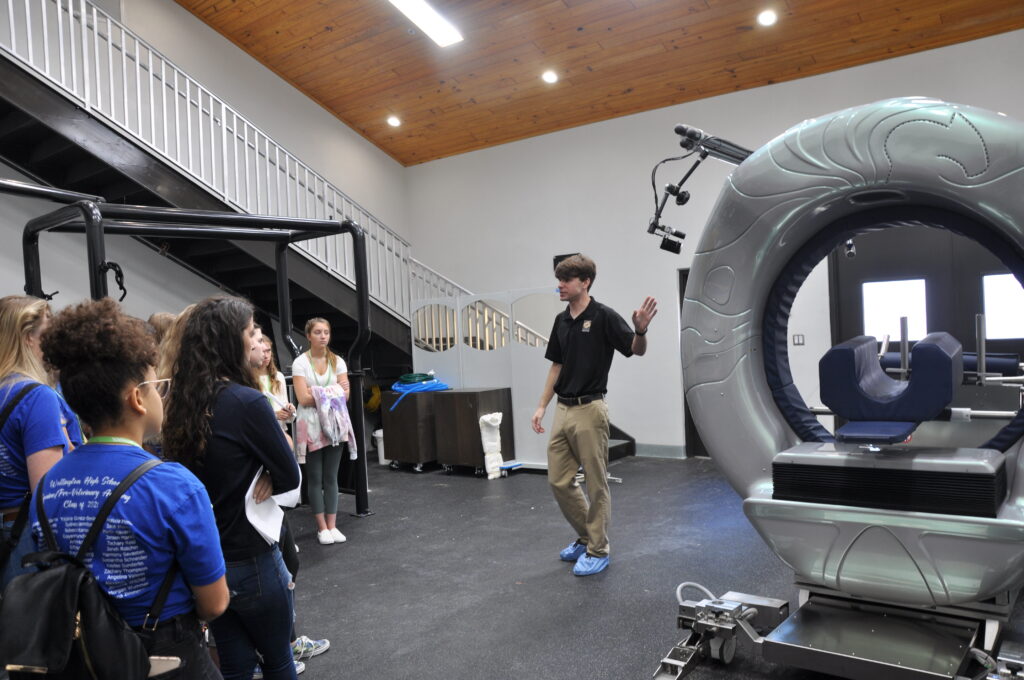
WHS seniors who choose to pursue the Equine Pre-Vet Program have a wealth of knowledge at their fingertips with one of the world’s most advanced equine medical centers just down the road. Palm Beach Equine Clinic is home to more than 30 world-class veterinarians who all know the process of becoming a top veterinarian within the industry.
Learning from a diverse team of veterinarians
Through the program at WHS and the generosity of the veterinarians at Palm Beach Equine Clinic, students in the Equine Pre-Vet Program have the unique opportunity to learn all about the profession from the very best. Seniors in the program are given the chance to shadow veterinarians as they work at the clinic, as well as out on ambulatory calls at the farms. The program requires that each student obtain a certain number of externship hours, but Palm Beach Equine Clinic allows the students to help and observe for as many hours as desired. Many students show a high level of interest and become highly involved at the clinic. Palm Beach Equine Clinic tries to accommodate each student for their participation at every level.
A program is also offered for junior students at WHS who are considering joining the Equine Pre-Vet Program when they become seniors. Junior students are invited to the clinic to learn about various paths in veterinary medicine and tour the facility in small groups. Palm Beach Equine Clinic sets up multiple stations for them to learn about things including blood work, physical exams, reproduction, and business management.

Palm Beach Equine Clinic’s Dr. Janet Greenfield-Davis is very involved with the program and enjoys teaching students of all ages. She has been involved in the local school system’s career day for younger children at the elementary level and also mentors the senior students who have already chosen the veterinary path involved in the externship program.
“We try to play an active role in our community, and we really enjoy having the kids visit the clinic,” said Dr. Greenfield-Davis. “When I went to high school, it was just general education, but now they really specialize in gearing the children towards specific programs in high school, and I think that is pretty impressive. To have PBEC right around the corner is handy for them, and it is nice for us to have the kids come through.
“We have some students that will come in on their own outside of school and ask to volunteer,” continued Greenfield-Davis. “We also have two girls that are in vet school now that started here in high school. They went to local colleges and they continued to come to our practice and participate all through college. We were able to write them recommendations for veterinary school, and they both got in, so we are super proud of them. We try to do all we can for the high school. We are really happy that we can provide those opportunities for the students and see them excel.”
Dr. Selina Passante-Watt traded in the cold winters of Canada for the sunny shores of South Florida and joined the practice at Palm Beach Equine Clinic in the fall of 2013. A veterinarian at just 32 years of age, Dr. Passante-Watt enjoys the team-oriented aspect and vast resources that working at Palm Beach Equine Clinic offers. She now splits her time between winters working at Palm Beach Equine Clinic and running a mobile practice with her husband in Western Canada during the summers.
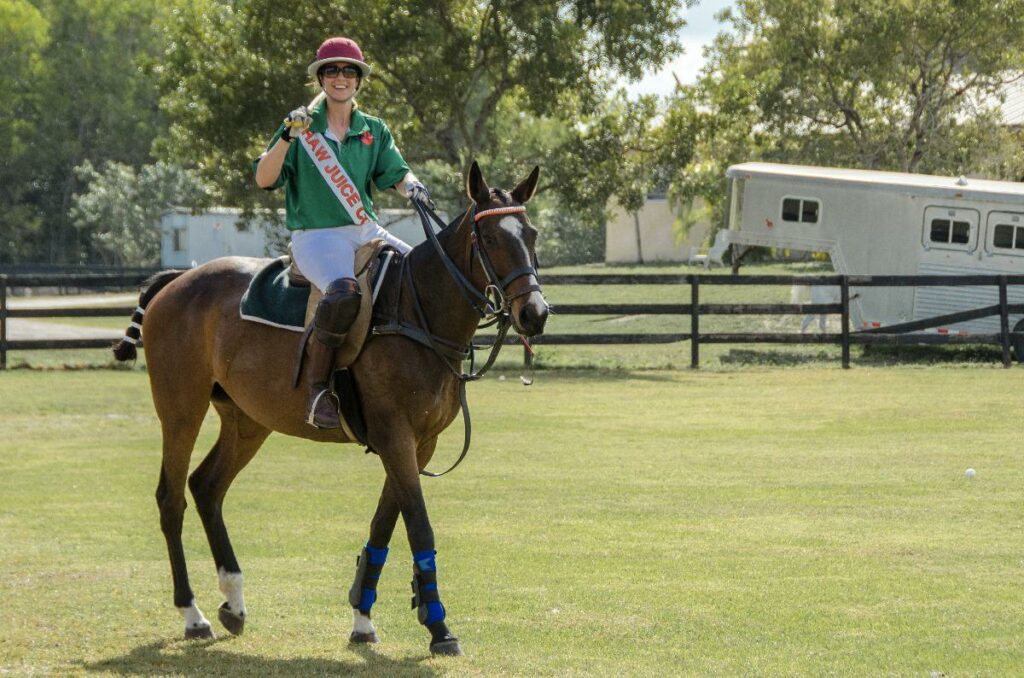
“There are a lot of specialists and very intelligent people at that practice, so the continual learning is incredibly valuable, especially as a young vet,” she acknowledged. “I learn every day. It is an amazing experience to be able to walk down the hall and knock on the door of one of the best board-certified surgeons or other specialist and say, ‘Hey, can you help me with this?’ You do not realize how beneficial that is until you leave, and you are in the middle of Western Canada and you wish that you had that.”
Originally from Winnipeg, Manitoba, Canada, Dr. Passante-Watt graduated from the Western College of Veterinary Medicine in Saskatoon, SK, in June 2012. After graduation, she moved west to Calgary, Alberta, and completed an internship in equine medicine and surgery at Moore Equine Veterinary Centre. She and her husband, who is also an equine veterinarian, relocated to South Florida in July of 2013 in order to pursue their equine veterinary careers.
Dr. Passante-Watt started riding when she was 10 years old and was a typical horse-crazy child. She took western riding lessons for a few years before falling in love with polo. When she was in high school, she got a job grooming and exercising polo horses in Winnipeg, which continued for six summers.
After high school, Dr. Passante-Watt was unsure what career path she wanted to take, so she embarked on a backpacking trip in Australia. She picked up small jobs while traveling, one being picking mangos. While on that mango farm, she found a small dog that was wounded from a fight with another dog. Dr. Passante-Watt took the dog, fixed his wounds, and nursed him back to health. It was that experience that inspired her to apply to veterinary school.
While attending vet school in Saskatoon, Dr. Passante-Watt met her husband, Dr. Walker Watt, and the pair got married in October of 2013. During his fourth year of vet school, Dr. Watt attended a conference and met some veterinarians from Teigland, Franklin, and Brokken, a racetrack practice at Gulfstream Park in Florida. He went to visit and did an externship there, later receiving a job offer. Dr. Watt and Dr. Passante-Watt then made the decision to move to Florida, where Dr. Watt took the racetrack job, and Dr. Passante-Watt found a position at Palm Beach Equine Clinic.
“Palm Beach Equine Clinic is a great practice,” Dr. Passante-Watt stated. “I have been working with Dr. Jorge Gomez, who works mainly on sport horses and more specifically on show jumpers, so it has been great getting involved in that world and receiving mentorship from Dr. Gomez. There is a lot of sport horse medicine that we do not see back home in Canada. It is a different world in Wellington; everything is a step ahead.”
The first year Dr. Passante-Watt and her husband moved to Florida, they stayed and worked for the full year. They then decided to split their time between the U.S. and Canada, just traveling to Florida for the winter season. They opened their own mobile practice in Western Canada, which Dr. Watt now runs year-round while his wife soaks up everything she can learn in Wellington throughout the winter.
“There is a lack of equine veterinarians in Southern Alberta where we live,” Dr. Passante-Watt explained. “There are a lot of mixed animal practitioners, but not a lot of specific equine practitioners, let alone in performance horses. That is why we decided to open a practice and just work on horses, and it has been going really well so far.”
Dr. Passante-Watt enjoys being able to draw on the resources of Palm Beach Equine Clinic even when she’s in Canada for the summer. “You can easily email people, send images, and pick up the phone and call someone with questions,” Dr. Passante-Watt stated. “I find everyone at Palm Beach Equine Clinic to be very helpful. As a vet early in my career, I think it is a great thing to work in a practice like that because it definitely pushes you to learn and be your best because you are working with the best.”
Having a state-of-the-art facility and equipment at Palm Beach Equine Clinic at her disposal throughout the winter is also a huge advantage.
“It is an amazing difference,” Dr. Passante-Watt noted. “I see both sides of it, because I am in Canada in the summer in my own small mobile practice with no bells and whistles, and then I come down to Palm Beach Equine Clinic and you have everything you could want at your fingertips. Every sort of pharmaceutical need, every tool, every cutting-edge technology, they just have it all right here. For the hospital, there are technicians and interns to monitor your cases overnight, and the 24-hour Intensive Care Unit is state-of-the-art. It is definitely set up to be successful, and with so many veterinarians, everyone is great about helping one another.”
Dr. Passante-Watt has many different veterinary interests, including diagnostic imaging, ophthalmology, lameness, dentistry and internal medicine. She really enjoys general practice, specializing in a little bit of everything. She is also certified in acupuncture and equine chiropractic from Options for Animals Chiropractic School.
As far as future goals, Dr. Passante-Watt plans to take it year by year, continuing to come to Palm Beach Equine Clinic in the winters, continuing to learn, and being the best veterinarian that she can be.
For Veterinary Technician Brianna Ploskunak, 22, of Royal Palm Beach, FL, horses are a passion. But not in the way you may think. Raised by a mother who rode and competed, Ploskunak found an early infatuation with all things equine that eventually drew her to veterinary medicine. At Palm Beach Equine Clinic, where she has been a part of the team since 2016, Ploskunak is one of 30 veterinary technicians who manage the hands-on care of equine patients and support the veterinarians in all aspects of the day-to-day operations. She works directly under Dr. Bryan Dubynsky, who specializes in sport horse medicine within the bustling competition atmosphere of Wellington, FL.
We caught up with Veterinary Technician Brianna Ploskunak to find out more:
What was your first introduction to horses?
My mom used to be a rider herself, so I grew up constantly surrounded by horses. She [rode] dressage for many years. I quickly followed in my mother’s footsteps and fell in love with the animal and the sport, although I never competed myself. Being around horses my entire life, I felt the need to do whatever I could to advance the health of each and every horse that I see. It means a lot to me to be able to contribute to their fast and healthy recovery.
What do you enjoy most about being a veterinary technician?
The number one thing I enjoy about treating horses is being a part of their journey from start to finish. Nothing brings me more joy than to see a horse that I have been working with through their recovery return to the show ring happy and healthier than ever before. These animals never cease to amaze me with their way of getting back onto their feet after an injury.
What is your average day like at Palm Beach Equine Clinic?
On an average day at Palm Beach Equine Clinic, I first meet Dr. Dubynsky to go over the morning appointments and gather all of the equipment and resources we need for the upcoming day. As we finalize our schedule, I work on completing all open items such as billing and inventory. We then prepare the truck to leave for the day and travel to a variety of different appointments throughout the Palm Beach County territory. Appointments vary depending upon the condition of the patient but often include radiographs and ultrasounds to injections and vaccinations. After we have seen all patients for that day, we return to the clinic and re-stock the inventory we have used that day. Lastly, we prepare for the following day by composing a new schedule of appointments and/or on-call horse show responsibilities.
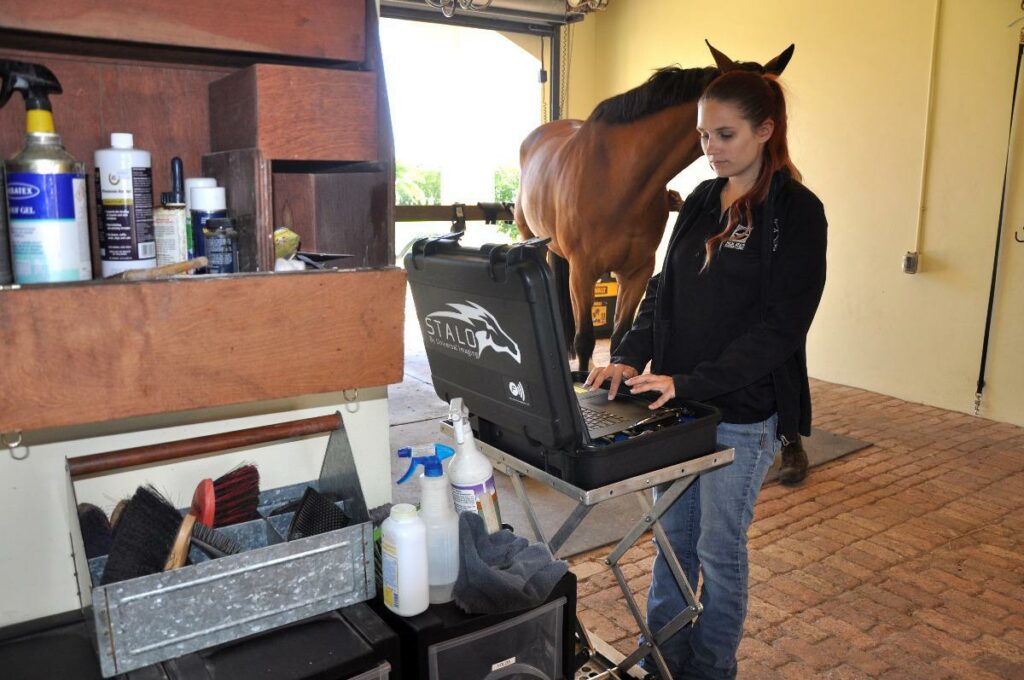
What is your favorite part about being a member of the Palm Beach Equine Clinic team?
My future goal is to continue to learn from the many experienced veterinarians I work alongside every day and build my experience and knowledge in the industry. That’s probably my favorite part as well; working alongside such talented and genuine people willing to give me multiple opportunities to learn and grow as a professional. It’s very hard to find a group of superiors willing to go the extra mile to teach young employees.
I have been able to experience some amazing things at Palm Beach Equine Clinic, including the intricacy of equine surgery and how the work of equine surgeons can bring a struggling horse back to top health. I really enjoy sports medicine because it’s not always sick horses – there is always something you can do to help the horse get back to peak performance. Whether it be radiographs, ultrasounds, injections etc., there is always something that can be done for the benefit and of the health of the horse.
What can we find you doing when you are not at Palm Beach Equine Clinic?
When I’m not working, you can catch me racing go-karts and spending quality time with my family, especially my one-year-old nephew, Elijah!
Palm Beach Equine Clinic (PBEC), based in Wellington, FL, is home to world-renowned surgeons, board-certified specialists, and state-of-the-art diagnostic technology. In addition, PBEC is home to over 30 veterinary technicians who provide comprehensive support to the veterinarians they work alongside.
PBEC takes pride in the diligence of the technicians who work in collaboration with the veterinarians to maintain the daily functionality of the clinic.
The typical responsibilities of an equine veterinary technician include:
- Manage veterinarians’ schedules
- Stock veterinarians’ mobile unit with supplies, equipment, and medications
- Accompany veterinarians on barn calls and emergency response
- Consult on cases with a veterinarian
- Care for and monitor horses admitted to the on-site clinic hospital
- Plan patient care and follow-up
- Oversee billing and invoices
According to Dr. Marilyn Connor, veterinary technicians are the right hands of the doctors they work with. PBEC employs over 30 technicians and the hands-on experience they have access to gives them invaluable opportunities to learn.
“One thing that is special about PBEC is that we have a full staff of technicians day and night,” said Dr. Connor, who first joined PBEC as an intern and now works as a full-time veterinarian. “They are the ones feeding and caring for horses, administering medications that do not require a doctor, and assisting veterinarians on cases. During the peak of the season, there are roughly 40 doctors with very diverse caseloads for technicians to learn and gain experience from.”
Yessica Arrua is one PBEC technician who has become an accomplice for veterinarian Dr. Natalia Novoa and the clinic in general. Arrua, 22, was born in Buenos Aires, Argentina, but now calls Florida home and is a pivotal part of the PBEC team.
5 Questions for Palm Beach Equine Clinic Yessica Arrua
1. How did you first get involved with horses?
I have been around horses since I was three years old. Both my parents have been working with horses since before I can remember. My dad works with polo ponies and my mom with dressage horses. They both traveled to Florida to pursue work with horses here and that is how I came to be a resident of Wellington and a team member with Palm Beach Equine Clinic.
2. What are your day-to-day responsibilities at PBEC?

I work with Dr. Natalia Novoa, who focuses on both traditional veterinary medicine and alternative therapies like chiropractic adjustments and acupuncture. My day-to-day responsibilities include making sure our truck is stocked with the equipment and medications that we may need. I also look after all the invoices in our system on a monthly basis. Overall, my role is to ensure Natalia has everything she needs and is prepared for our farm call visits.
3. What do you enjoy most about working with equine veterinarians and the horses they treat?
Other than being around horses every day, which is the best part of my job, I really enjoy being able to experience all the different types of cases that come through Palm Beach Equine Clinic. Especially during the winter season, we see so many interesting cases from emergencies to routine exams.
4. Do you have a favorite case?
My favorite cases to work on are the ones where horses have anhidrosis, which we see often in the Florida heat.
There is no universal or proven treatment for anhidrosis, but people often try salts, electrolytes, thyroid supplements, and even beer. But, Dr. Novoa has been able to help these horses with acupuncture. We had one case where the horse didn’t respond to any traditional treatments but started sweating right away during our first acupuncture treatment.
What is Anhidrosis? According to the American Association of Equine Practitioners (AAEP), anhidrosis is a compromised ability to sweat in the face of exercise or high ambient temperatures. This is a potentially dangerous condition for horses, especially working horses, because they thermoregulate (maintain a consistent body temperature) primarily through sweating.
5. What can we find you doing when you aren’t working at PBEC?
You will find me at the beach, reading, and spending time with my family!

